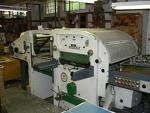A machine is any device that uses energy to perform some activity. In common usage, the meaning is that of a device having parts that perform or assist in performing any type of work. A simple machine is a device that transforms the direction or magnitude of a force without consuming any energy. The word "machine" is derived from the Latin machina.
Usage
Historically, a device required moving parts to be classified as a machine; however, the advent of electronics technology has led to the development of devices without moving parts that are considered machines—the computer being the most obvious example.
"Engines" are machines that convert heat or other forms of energy into mechanical energy. For example, in an internal combustion engine the expansion of gases caused by the heat from an exothermic chemical reaction results in a force being applied to a movable component, such as a piston or turbine blade.
Machines are ubiquitous in a wide variety of industrial, commercial, residential and transportation applications. Those employing hydraulics are especially useful in manufacturing and construction.
Types of machines and related components
Simple machines Inclined plane, Wheel and axle, Lever, Pulley, Wedge, Screw
Mechanical components Axle, Bearings, Belts, Bucket, Fastener, Gear, Key, Link chains, Rack and pinion, Roller chains, Rope, Seals, Spring, Wheel,
Clock Atomic clock, Chronometer, Pendulum clock, Quartz clock
Compressors and Pumps Archimedes' screw, Eductor-jet pump, Hydraulic ram, Pump, Tuyau, Vacuum pump
Heat engines External combustion engines Steam engine,
Internal combustion engines Reciprocating engine, Gas turbine
Linkages Pantograph, Peaucellier-Lipkin
Turbine Gas turbine, Jet engine, Steam turbine, Water turbine, Wind generator, Windmill
Aerofoil Sail, Wing, Rudder, Flap, Propeller
Electronics Vacuum tube, Transistor, Diode, Resistor, Capacitor, Inductor
Miscellaneous Robot, Vending machine, Wind tunnel,Check weighing machines, Riveting machines
.jpg)